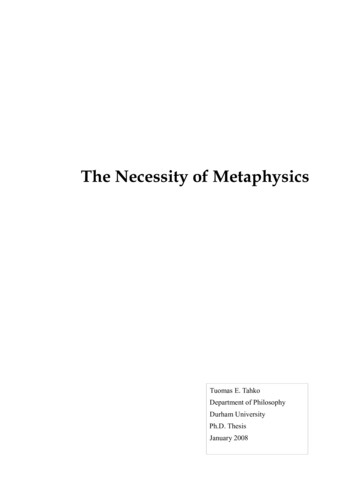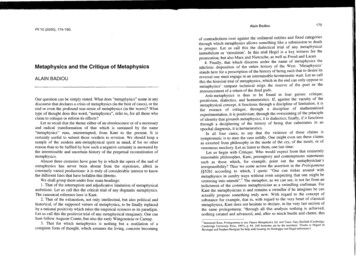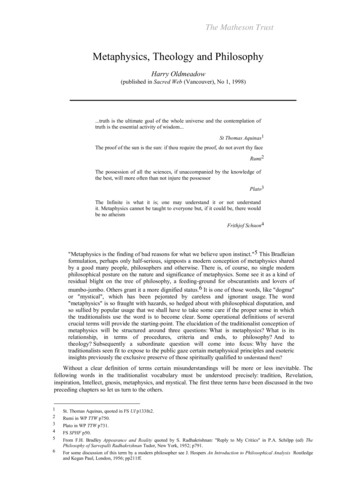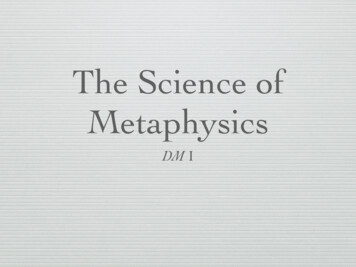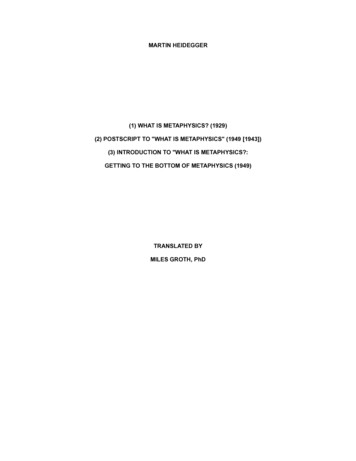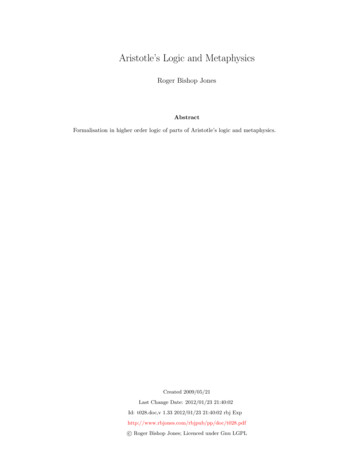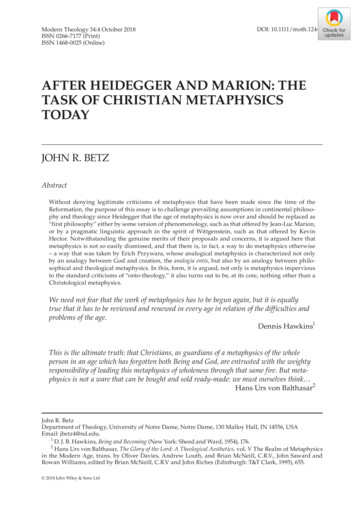
Transcription
1From E. J. Lowe'sThe Possibility of MetaphysicsThe Possibility of MetaphysicsIn the Preface, I explained that the overall objective of this book is to helpto restore metaphysics to a central position in philosophy as the most fun damental form of rational inquiry, with its own distinctive methods andcriteria of validation. But if such a project is not to be stifled even beforeits inception, we need to have some assurance that its aim is a coherentand legitimate one. To provide such assurance is the purpose of this firstchapter, which will also serve as an introduction to some of the book'sthemes.l. WHAT IS METAPHYSiCS')It was Immanuel Kant who first asked 'How is metaphysics possible?,1 ButKant supposed the subject-matter of metaphysics to comprise a priorisynthetic truths, and we have since come to doubt whether there is such aclass of truths, not least because the analytic/synthetic distinction hasitself become doubtful following W. V Quine's attack on it. The apriori/a posteriori distinction, on the other hand, is still taken seriously,and indeed has had new life breathed into it by the work of Saul Kripke. 3But Krioke's work. too. undermines Kant's'How is metaphysics possible?' needs to be asked anew, and even to beunderstood in a new way. But the question is quite as pressing for us as itwas for Kant. Metaphysics is under assault from many sides, both fromwithin the ranks of philosophers and from various external forces. Despitethese attacks, metaphysics has been enjoying something of a revivalamongst so-called analytic philosophers, after a barren period duringwhich first logical positivism and then ordinary language philosophySee Immanuel Kant. Critiquf!Macmillan. 1929). B 22.2 See W. V. Quine. 'Two2nd edn. (Cambridge. Mass,.lPUI't.'Reason, trans, N.Smith (London:, in his From a Logical Point of View.Press, 19(1).Blackwell, 1980).
2THE POSSIBILITY OF METAPHYSICSprevailed, both of them hostile toare no longerthe reality of universals or the existence of abstractentities. So we need to understand what can legitimate such inquiries andwhat epistemological status their conclusions can justifiably lay claim to.As a preliminary, we need to fix upon some reasonably uncontentiouscharacterization of what metaphysics should be understood to have as itsmain concern. Traditionally, metaphysics has been thought of as the sys tematic study of the most fundamental stmcture ofthat is the view of it which I should like to support. Understanding theaim of metaphysics in this way makes defending the possibility of meta physics a substantial and problematic task, and for that reason one wellworth exploring. By contrast, to understand the aim of metaphysics assomething less ambitious than this -for instance, as the attempt toanalyse our currently accepted ways of talking about what we unretlec tively take to be certain general features of the world we live in-wouldmake its justification less difficult, but only at the expense of making meta less interesting and less worth doing. Should metaphysics as tra conceived turn out to be impossible, we may still be able topursue these less ambitious projects; but let us not pretend that in doingso we would be doing anything worth dignifying by the name 'meta physics'.I confess that characterizing metaphysics as the systematic study of themost fundamental stmcture of reality hardly sounds very precise. But 1am not offering a definition, imprecision in which would indeed be adefect. I do not think it would be at all profitable to pursue a definition of'metaphysics', because the danger would be that it would be framed in away which favoured one metaphysical position over others for instance,in a way which presumed the reality of space, or of causation, when thereality of these things may be denied by some metaphysical systems. Asimilar defect would attend any attempt to specify the subject-matter ofmetaphysics by means of a list of topics it supposedly embraces. Oneonly to look at the highly varied contents of modern textbooks of meta to see how arbitrary such an approach would be. Of course, a con sequence of not providing an absolutely clear-cut delineation of theprovince of metaphysics is that metaphysics may not appear clearly dis tinct from certain other enterprises, such as those undertaken in the nameof the empirical sciences. However, although I shall later argue that allempirical science presupposes metaphysics, I do not in fact bclieve that aclear-cut distinction should be made between metaphysical concerns andconcerns of science. Drawing sharp bound and is not needed in order toTHE POSSIBILITYorMETAPHYSICS3the core ofcredentials areIn any case, my hope is that when I come, in duecourse, LO attempt to argue on my own account f()r the possibility of meta physics, my conception of the subject-matter and methods of metaphysicswill emerge more clearly. In effect, I shall be filling out my preliminarycharacterization of metaphysics by characterizing metaphysics as the dismade possible by the sort of defence that I shall offer.2. HOW IS METAPHYSICS POSSIBLE'!Before I present that defence, I want to look briefly at some rival answersto the question 'How is metaphysics possible'?' which are currently pop ular in various quarters. Some of these answers are frankly antimeta downgrade the status ofof the name and are thuscovertly antimetaphysical too. An antimetaphysical answer to our ques tion is, then, either one which simply denies that metaphysics, as tradi tionally conceived, is possible, or else one which defends the possibility ofsomething else undcr the name of 'metaphysics', while implicitly aban doning the real thing. Other answers which I shall reject do attempt todefend the possibilitv of something recognizably akin to metaphysics asdo so in ways Tconsider to bewhich I shall consider only to(somewhat tendentiously) relativism, scien t ism, Ilco-Kantianism, andsernanticism. These are all 'modern' views, though some obviously havehistorical precedents. 1 shall not examine, here, certain more traditionalposItIOns such as 'rationalism' and 'empiricism', as supposedly exempli fied by such historical figures as Descartes and Locke-because these werepositions developed before Kant raised his momentous question, 'How ism Its latestthis question is, quite simply, that metaphysics is notbecause metaphysics is the misbegotten product of western intellectualhubris, the mistaken search for a non-existent 'objective' and 'total' truth,guided by supposedly timeless and universal principles of logic. Truth andreason, according to this view, are culture-bound concepts of strictly lim ited utility. The notion that there could be a 'fundamental structure of. for us to discern is deemed absurd and paradoxicaL becausewe call 'realitv' is (supposedlv) alwavs iust some human construction sat
4THE POSSIBILITY OF METAPHYSICSTHE POSSIBILITY OF METAPHYSICSurated by interest-driven interpretation. My reply to antimetaphysicalclaims of this sort is as follows. First, to the extent that they amount tomere assertions, unsupported by reasoned argument, they do notserious attention. The fact that their proponents are often contemptuousof the value of reasoned argument itself this being one of the primethe defenders of metaphysicsobjects of their attack by no meansto take them seriously. If the relativists wish to decry the notion of rea soned argument as a parochial cultural artefact, then thcy deny them selves any basis for their own assertions but ingrained prejudice, and weshould be content to let them wallow in it if it gives them satisfaction.Secondly, if these claims are alleged to be supported by evidenceinstance, of a sociological or anthropological s()rt then it has to bepointed out that in fact such evidence as is available supports nothing soextreme: it does not, and cannot, show that human beings are incapableof escaping from culture-bound and interest-driven conceptions ofworld, but at most that they often fail to do so. Indeed, the very fact thatsome human beings have discovered that many human beings fail to dothis shows, if it shows anything, that we are not incapable of making suchan escape. Thirdly, it is characteristic of the relativist attack on meta physics that it deliberately distorts what it seeks to denounce. It representsmetaphysicians as laying claim to infalliblc insight into cternal and uni versal truths, uncoloured by any human perspective. But only the mostnaive or dogmatic metaphysician would make such bald claims. One ofthe primary aims of metaphysics is precisely to understand, in some meas ure, our own relation to the rest of reality, and of necessity it undertakesto do this from the position in which wc find ourselves. The fact that wecannot stand outside ourselves to study that relation need not imply thatit cannot be studied by us at all.A second popular response to the question of how metaphysics is pos sible is to claim that it is so because, to the extent that there is a legitimateprovince of metaphysical inquiry, it is one entirely catered for by theempirical sciences. On this view, it is these sciences, if anything, that cantell us about the fundamental structure of reality. This being so, there canbe no scope for a distinctly 'philosophical' approach to the questions ofconceived as an approach different in its methods orembraced by the empirical sciences. ,"or instance, ifthere are fundamental questions to be raised about the existence andnature of space and time, it seems to follow that these can only beanswered by such sciences as cosmology and quantum physics. There canbe no room for 'armchair' philosophical speculation or 'conceptualsis' as routes to addressing such questions. To the extent that metaphysi cal questions are genuinely answerable, it will be said that they are being:;answered by people working in departments of physics, not by peopleworking in departments of philosophy.A view like this is often to be found expressed, either explicitly or in abarely disguised form, in modern books of popular science, designed toconvey to a lay audience the arcane deliverances of the latest theories inphysics-theories claiming, for instance, that space 'really' has many morethrce dimensions or that the universe is the result of a quantum l1uc tuation in the vacuum and so came from 'nothing'. In a subtler form, adevotion to scientism as I call the doctrine that such legitimate meta questions as there arc belong to the province of the empirical sci ences--is even to be tound, ironically enough, in many departments ofphilosophy. A version of it has there become dignified under the title of'naturalized epistemology'. This is the view that all human knowledge including any metaphysical knowledge that we may lay claim to is aproduct of our biological nature as cognizing animals, and is hence to bestudied by the methods of the life sciences, including psychology and evo lutionary theory. Thus we see a bizarre situation arising in which popu larizing scientists denounce the pretensions of philosophers while manypeople whom they are criticizing have in fact already abdicated anyclaim to know better than the scientists how to address the auestions ofmetaphysics.In my opinion, both types of devotee of scientis111 ·those drawn fromthe ranks of scientists and those drawn from the ranks of soi-dis(Jlltphilosophers exhibit a blinkered dogmatism which is the very antithesisof genuine philosophy. Both fail to see that science presupposes meta physics and that the role of philosophy is quite as much normative asdescriptive with everything, including science, coming within its criticalpurview. Scientists inevitably make metaphysical assumptions, whetherexplicitly or implicitly, in proposing and testing their theories-- assump tions which go beyond anything that science itself can legitimate. Theseassumptions need to be examined critically, whether by scientists them selves or by philosophers- and either way, the critical philosophicalthinking that must be done cannot look to the methods and objects ofempirical science for its model. Empirical science at most tells us what isthe case, not what must or nmy he (but happens not to be) the case.Metaphysics deals in possihilities. And only if we can delimit the scope ofthe possihle can we hope to determine empirically what is actual. This isempirical scicnce is dependent upon metaphysics and cannot usurplatter's proper role.A third response to our question 'How is metaphysics possible?' is,unlike the first two, genuinely philosophical, drawing its inspiration fromKant-whence I call it neo-Kantian. According to this view, metaphysicst
THE POSSIBILITY OF METAPHYSICSTHE POSSIBILITY OF METAPHYSICS'as it is ineven makes sense. But it can''-Hwlly necessary features of ourFor instance, it may be able to establish that we mustthink of the objects of perception as being situated in space and time andas being related causally to one another-perhaps on the grounds that, asKant himself held, a recognition of ourselves as self-conscious beingswhose thoughts and experiences are ordered in time requires us to makereference to such a world of perceptible objects. By opting for a less ambi tious aim, it is hoped that the possibility of a suitably modest metaphysicsmay be secured. However, such a position is fatally Hawed, if its intentionis to render 'metaphysical' claims legitimate by construing them as notventuring to speakhow things really are, as opposed toof them as being. For we, if we are anything. arc Dart ofso that tonecessary features of our .is being claimed about the nature of 'reality' is to contradictTrying to make metaphysics safe by drawing in its horns in thisway is an exercise which is doomed to failure.Still more unsatisfactory is any attempt to legitimate metaphysics byenfeebling it yet further, by construing its claims as being merely descrip tive of a conceptual scheme we find ourselves possessed of: without evenpurporting to establish the inevitability of that scheme. Metaphysicalinquiry must at least be critical, so that to the extent that it deals in 'con cepts' it cannot rest content to describe or analyse the concepts that weh . ",,,,, to have, but should, rather, seek to revise and refine these conceptsBut the ooint of such revision. if it has a point, can.mere internal conis too modest an aim,manyschemes could equally possess this feature. 5 If it issuggested that choice between such schemes can be rationally madeselecting what docs least violence to our 'natural' beliefs or 'intuitions',leaving us in a condition of 'reflective equilibrium', then again it must beobjected that an exercise of this sort does not deserve to be dignified bythe name 'metaphysics', because we have no right to suppose that our nat ural beliefs reflect the fundamental structure of reality. It is one of the fewthatprocesses which areour namral oeHers arethan to thegeared to the practical demands of survivaldemands of metaphysical truth.The fourth and final response I wish to criticize is what I call sen/anti cism. This is the view, notably subscribed to by Michael Dummett, thatmetaphysical questions can in principle be resolved by recourse to (andonly by recourse to) the theory of meaning. 6 Thus, whether we are entitledto take a 'realist' view of some area of discourse, such as talk about settheory, or quantum physics, or the past, is to be decided by whether or notan adequate theory of meaning for that area of discourse will assign 'real ist' truth-conditions to its sentences, that is, truth-conditions which reflectto the Ofinciole of bivalence as far as67Ii:tIU:-lll, becauseproponents such as Dummett regard the theory of meaning asthe only legitimate basis for a theory of the structure and content ofthought. 7 Thus semanticism only gives a linguistic dress to a kind ofapproach to metaphysics which we have already considered and rejected.If anything, semanticism threatens to reduce metaphysics to somethingeven more parochial, by making answers to its questions turn on the lin guistic practices of an arbitrarily chosen human community. No doubtthe semanticist will claim that the features of the theory of meaning whichare pertinent to metaphysical concerns are 'deep' ones. which transcenddifferences between different human speech communities. But what sortof basis would such a claim have? If merely anthropological. we are backofdetermine what counts as,The basic problem with semanticism is that, to the extent that one canlegitimately appeal to considerations of meaning in order to answer meta physical questions, the considerations in question must not be merely onesof what we do mean-for there is no guarantee that we mean anythingvery precise or coherent by what we say-but, rather. they must be con siderations of what we should mean. This is to reiterate the point thatmetaphysics must be critical and potentially revisionary of our currentlyaccepted concepts and beliefs. However, questions of what we shouldmean cannot be answered wholly from within the theory of meaning, butrequire recourse to independent metaphysical argument. An illustration4 By implication. I mcan hcre toboth P. E Strawson's distinction between'descriptive' andrejection of the latter: sec his Individuals:AnLonoon: Methuen, 1959),9 ffscepticism about this, as expressed in 'On theinto Truth and InterpretationSec Michael Dummett. 7/le l.ogica/ BasisIntroduction.Michael Dummett, Originsch.13.6l(London: Duckworth.(London: Duckworth, 1993),
8THE POSSIBILITY Of' METAPHYSICS3. METAPHYSICAL POSSIBILITY AND THEPOSSIBILITY OF METAPHYSICSThe time has now come for me to offer my own answer to the question ofand if so how. metaphysics is possible. My view is that it is indeedSee Michacl Dummctt. Frege:0/ Language. 2nd cdn. (London:}'rl'ge's COllception,Vumhers (ISDuckworth. 1981). eh. 4. Sec also ('rispin(Abcrdccn: Abcrdcen Univcrsity Prcss, 1983), 53 If. and BobAhstracI(Oxford: BlackwclL J 987), eh. 2.9 I explain this more fully in my 'Objects and Criteria of Identity', in Bob Halc andCrispin Wright. eds. A Compllnion 10 III(' Philosophyof' Language (Oxford: Blackwell,1997), and in Chapter 2 below.I() I have in mind here what W V. Quine says in 'Speaking of Objects' and 'Ontologicalsee his Omological Relalivity and Other Essays (New York: ColumbiaPress, 1969).THE POSSIBILITY Of' METAPHYSICS9it is possible to achieve reasonable answers tofundamental structure of reality -questionsmore tunaamental than any that can be competently addressedicalBut I do not claim that metaphysics on its own can. inteIl us what there is. Rather-to a first approximation I hold that meta physics by itself only tells us what there couldphysics has told us this, experience can then tell us which of variousalternative metaphysical possibilities is plausibly true in actuality. Thepoint is that although what is actual must for that very reason be possible,alone cannot determine what is actual, in the absence of aof the possible. In short, metaphysics itself ispossible indeed necessary as a form ofbecause metaphysical possibility is an inescapable determinant of actu ality, Stated in this highly abstract and condensed way, my answer mayappear obscure and even gnomic, so my task in what remains of this chap ter will be to unfold its implications.So far I have begun to forge a link between the possibility of meta the notion of metaphysical possibility. The idea is that therealm of metaphysical possibility is a genuine one which needs to beexplored, or at least assumed, before any claim to truth in actuality canbe legitimated by experience. And this is a realm which cannot. of course,be explored solely by the methods of the empirical sciences, preciselybecause they merely purport to establish what is true in actuality on thebasis of experience, and hence presuppose metaphysics. But it may beobjected here that the only sort of possibility which the empirical sciencespresuppose is logical possibility-and that this can be establishedrecourse to a distinct discipline of metaphysics, becauseis simply a matter of compliance with the a priori laws ofit may be urged that the only precondition which needs to be met by thetheories of empirical science, before they are tested in the court of experi ence, is that they should not entail a logical contradiction. However, in thefirst place, the deliverances of experience itself can only be assessed in theof metaphysical possibility and, in the second, such possibility is nottantamount to mere logical possibility as characterized a momentago. I shall develop the latter point more fully in the next section when Ihow metaphysical possibility may be defined, but somenary observations concerning it are appropriateThe logical possibility of a proposition or set of propositions, as char acterized a moment ago, is simply a matter of its (or their) not entailing alogical contradiction. Hut metaphysical possibility is something quite dis tinct from this. In the first place, it is not-or, at least, is not merely-thepossibility of a proposition (or set of propositions), but rather the
THE POSSIBILITY OF METAPHYSICSTHE POSSIBILITY OF METAPHYSICSpossibility of a state of «flairs (one which is representable, no doubt, by aproposition): and so in this sense it is a 'real', or de re, possibility. Thenotion of a state of affairs, of course, is itself a metaphysical notion, justone of a large family of such notions, some more basic than others. Othernotions in this family are the notions of an object, a properly, a relation,a kind, a part, a mh'll1nmust embody some recognition, however partial and distorted, of themetaphysical categories in terms of which the fundamental structure ofreality is to be articulated. Since there is room for debate about that struc reflect some meta ture, it is un surprising that difTerent naturalphysical categories more prominently than others. Such difTerences reflect,in all probability, differences in the tacitly held metaphysical beliefs of dif ferent human speech communities. But although linguistic structure canserve toand entrench those beliefs, the 'Whorfian' viewstructure is the source of them is, r considel quite un sus 10are 1ennable in termsis itself a matter for metaphysIcal debate. ·1 husas wein Chapter 6 a substance might be defined to be an objectwhich does not depend for its existence upon any other objecT (wheredependency is defined in terms of necessity). I I These metaphysicalnotions are not purely 'logical' notions: they are ontological. 12 They con cern being and its modes, whereas logic, properly understood, does notconcern being in general but, rather, the formal properties of and relationsbetween propositions (which constitute only a small part of what thereMoreover, these metaphysical notions are in a certain sense transcenden in that they are not derivative from experience but are on theto be invoked in construing what experience reveals of reality. Clearly,they are closely related to the categories of Aristotle and Kant, but myaccount of them crucially differs from Kant's (and is thereby closer toAristotle's) in that 1 regard them as being genuinely applicable to realityand not merely to our thought about reality. They are not categories ofthought, but categories ofThis is not, however, to say that thea given category to reality can, in general,determinedits possible applicability may bewe may not be able to establish aare any substallces, only that there could be. Only by recourse to experi ence, perhaps, can we have reason to believe that there are.Of course. the 'semanticist' will claim that these 'categories' are justreflections of, and entirely derivative from, semantico-syntactic features ofthe natural languages which we happen to employ- the notion of an'object' corresponding to that of a singular term, the notion of a 'prop erty' corresponding to that of a predicate, and so on. But I1 consider this view to invert the properthis sort as may exist do so because any lan evolved as a means to expressing11 I examine various definitionsthese lines in my 'Ontological Dependency'.in Cbapter 6 below,Philosophical P({p('rs. 23 (1994). :1 J 48.Compare Harry Smith, 'Logic, Form and Malter', Proceedings of lhe ArislOlelianSociety. supp. vol. 55 (1981 ). 47 63,IIr began to talk about metaphysical categories in the course of intro ducing the notion of metaphysical possibility and urging that it difTersfrom that of mere logical possibility. The metaphysical possibility of astate of affairs is not determined simply by the absence ofin the propositions used to describe it-though, of course, such anabsence of contradiction is a minimal requirement of metaphysical pos par exC"ellence of a question of meta of whether there could be vague objects,for which there could fail to be a fact of the matter as totheir identity or diversity in certain circumstances. (We shall return to thisand related questions at much greater length in Chapter 3.) Now, it is trueenough that a number of philosophers, notably Gareth Evans, haveargued against this possibility by attempting to derive afrom the supposition that a given identity statement is of indeterminatetruth-value, a supposition which may be expressed by a proposition of the.14 As itI consider that this argument isthat a contradiction canno{ be derived from the suppo in question. IS It doesn't follow, however, that I must consider theexistence of vague objects to be metaphysically possible. Indeed, I havegrave doubts about this, because-as 1 shall explain in Chapter 2 1 con sider that the only metaphysically defensible notion of an object is pre cisely that of an entity which possesses determinate identity-conditions. J (,Thus, although I have, elsewhere, referred to the domain of subatomicparticles as providing putative examples ofLl'I' f//lOrr. ed. J.view, see MichaelDevitt and Kim Sterelny,and RealilY (Oxford: Hlackwell, 1987), chs. J 0 and 12.14 Sec Gardh Evans, 'CanBe Vague Objects?'. Al1l1lvsis, 38 (1978).208.15 See my 'Vague Identity and Quantum IndcLcrminacy', Analysis, 54 (1994), 110--14,and also Chapter 3 below.16 See also my 'The Metapbysics of Abstract Objects', Journal of Philosophy, 92 (1995),509-204, and Chapters 2 and 3 below.See Language, Thoughl and Realil}": S('/el'led WrilingsB. Carroll (Cambridge, Mass.: MIT Press, 1(56). For criticism of
THE POSSIBILITY OF METAPHYSICSTHE POSSIBILITY OF METAPHYSICSidentity may, in certain circumstances, beat a deeper level I amsympathetic to the view that what the relevant empirical evidence showsis that it is wrong to think of electrons and the like as really being oNectsat alL (Let it not be supposed, however, that this is just a verbal issue aboutmeaning of a word, 'object': the deeper point is that a satisfactory sys tem of metaphysics needs to mark a fundamental division betweenentities that do, and those that do not, possess determinateconditions-and appropriate use of the term 'object' servespurpose.) Thus we see that the validity of a claim that a certain state ofaffairs is metaphysically possible does not simply hinge on the question ofwhether or not the propositions used to describe it entail a contradiction,but rather on the question of whether acceptable metaphysical principlesand categories permit the existence of that state of affairs. And this is amatter for distinctly metaphysical debate. A general comparison might bedrawn hcre with questions of what is rnoral1y possible or permissible,which again cannot be settled purely by considerations of logic since atsome stage distinctly moral notions must be brought in to playa substan role in any argument for the moral permissibility of a given state ofaffairs.Let us look at another group of examples in order to reinforce thiS con clusion. Metaphysicians have long debated about the possibility of changeand the reality of time-and we too shall be exploring these questions insome depth in Chapters 4 and 5. However, they are neither purely empir nor purely logical questions. How we should conceive of time is itselfa metaphysical question-a question of how, if at all, the notion of timeis to be related to more fundamental metaphysical notions, including thecategories. For instance, one view (the 'Aristotelian' view) is that time isthe dimension in which alone a substance can receive contrary qualities,and this, if correct, would seem to imply at least three things: that sub stances must be able to persist identically through qualitative change,there cannot be time without change, and that the unity of time rests uponthe persistence of substances. Although I happen to agree with theseclaims, 18 I readily concede that they are controversial. But what I want toinsist on just here is, first, that these issues are potentially capable of res olution through rational debate, and, secondly, that the kind of argumentinvolved in such debate is distinctly metaphysical. Showing that time ismetaphysically possible is not just a matter of demonstrating theconsistency of temporal discourse by, for example, rebuttingMcTaggart's arguments to the contrary19-nor is it simply a matter of for along the lines of, say,mulating a consistent physical theory ofEinstein's special theory of relativity. Einstein's theory makes certain fun damental claims about time-for instance, that simultaneity is relative andvelocity of light cannot be surpassed-but that it doesconcern time, and that in having such a concern it concerns somethingwhose reality is possible, are metaphysical questions which no merelyscientific theory of this sort can settle.While on the subject of time and change, here is one final, and quiteexample which will serve to illustrate my general point. TheeXi:1l11lJll;: concerns the 'possibility' of one thing's becoming two, withoutthereby ceasing to exist the intended implicationthat in such asituation we would supposedly have, at a later time, two numerically dis tinct things which were formerly numerica
characterization of what metaphysics should be understood to have as its . main concern. Traditionally, metaphysics has been thought of as the sys tematic study of the most fundamental stmcture of . that is the view of it which I should like to support. Understanding the . aim of metaphysics in this way makes defending the possibility of meta



